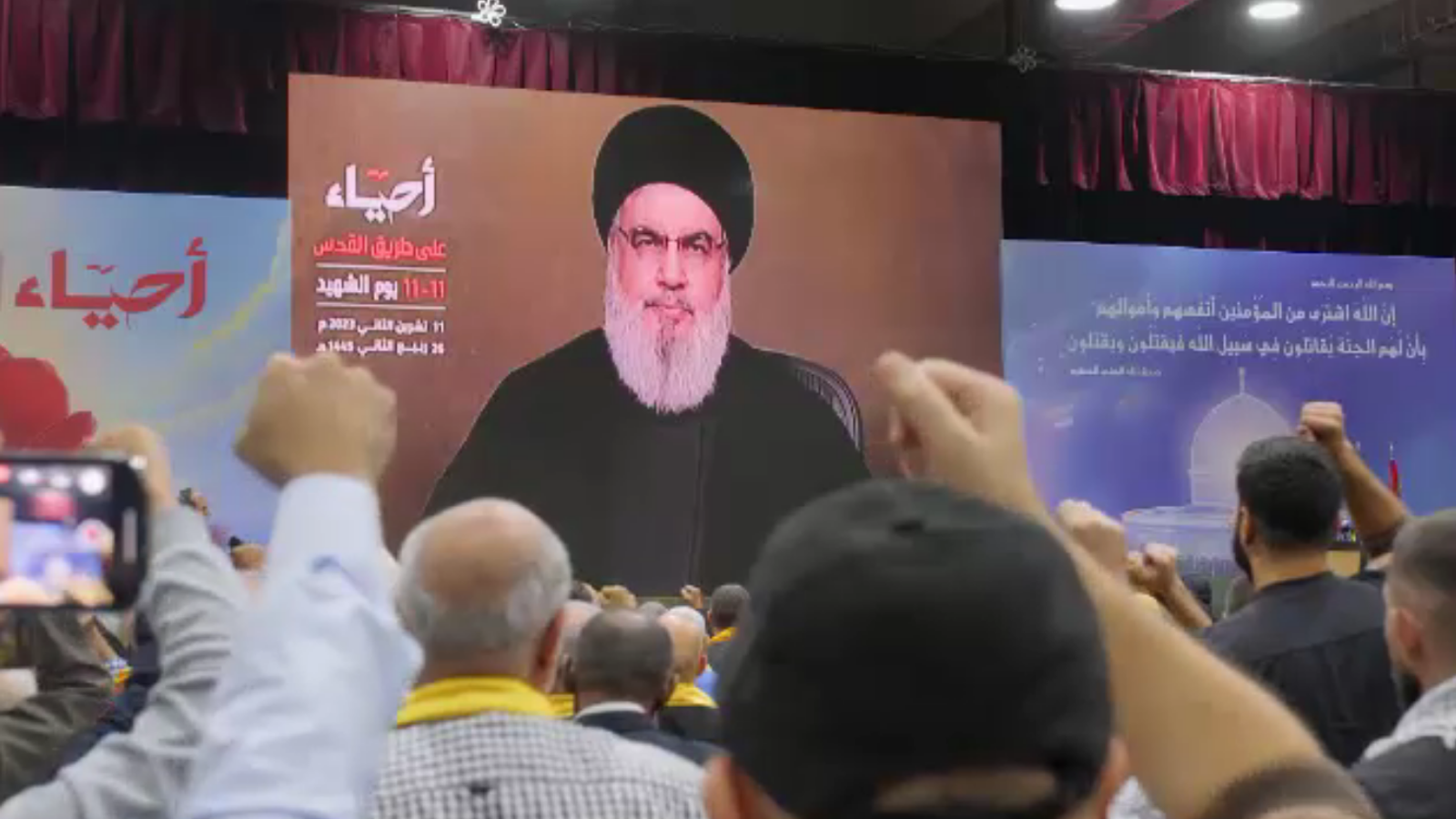The Lebanon-based group and Israel have been engaged in a tit-for-tat war of increasing intensity and severity.
By John Sparks, International correspondent @sparkomat
Operational security is always tight when the most powerful political and military faction in Lebanon organises an event.
The details for Hezbollah’s annual Martyrs’ Day commemoration were provided an hour or so in advance and we found ourselves driving through a section of south Beirut that forms the Iran-backed organisation’s stronghold.
We arrived at a local school, had our bags checked by guards clothed in black and were led into a cavernous basement that had been converted into a great assembly hall.
Follow latest updates: Tensions remain on London streets after march
Men and women, wrapped in yellow scarves, sat down on opposite sides of the hall and we were told they were the family members of the martyrs – the Hezbollah fighters who have died fighting in Lebanon and further afield.
The first Hezbollah martyr was a man called Ahmad Kassir. A suicide bomber – or ‘self-sacrifice operative’ in the words of the Iran-backed Shiite group – he blew up his vehicle in front the Israeli military’s headquarters in southern Lebanon in 1982.
Hezbollah is fuelled by its opposition to Israel and Western influence in the Middle East. It has been designated a terrorist organisation by the UK, the US and many other countries.
Its members have been deployed throughout the region, defending Bashar al Assad’s regime in Syria and training members of Hamas. Well over 70 of its fighters have died since the conflict in Gaza began on 7 October.
Hezbollah and Israel have been engaged in a tit-for-tat war of increasing intensity – and severity – and when the women in the hall hoisted pictures of loved ones killed on the battlefield, we knew there would be images of new martyrs among them.
Zeinab Rmoyti lost her son 7 days ago after he was killed by an Israeli airstrike. Ali Ibrahim Rmoyti was only 28 years old yet there was no trace of sorrow in his mother’s face.
I asked her what was going through her mind.
“We are not worried. My son died on the road to Jerusalem while defending the children and women of Gaza. Their homes are being destroyed and no one’s looking after them.”
“How will this end,” I asked her. “How will the cycle of violence we are witnessing ever stop?”
“Israel does not want peace, this violence ends if Israel stops the violence. Are the children of Gaza fighting Israel? Are the women of Gaza fighting Israel? They are not fighting. When Israel ends this war, the violence will stop.”
Some came to honour their loved ones – but others packed the basement to hear the leader of this powerful Shiite faction speak.
Read more:
What is Hezbollah and how powerful is its military?
Analysis: War between Israel and Hezbollah would be far more dangerous than current conflict
Hassan Nasrallah has not appeared in public for many years and when the Hezbollah chief did appear, his image was projected from a giant video screen.
Nasrallah said there had been “an upgrade” in Hezbollah’s operations along its front with Israel.
Hezbollah ‘ready for any sacrifice’
“There has been a quantitative improvement in the number of operations, the size and the number of targets, as well as an increase in the type of weapons,” he told the assembled crowd.
It is clear that the war on the Israeli border is intensifying. Nasrallah stated that new drones packed with explosives and powerful missiles have now been deployed.
Yet his threat to escalate could spiral out of control.
In response to Nasrallah’s comments, Israeli prime minister Benjamin Netanyahu later issued a warning.
Israel warns Lebanon over its ‘fate’
He said: “I warned Hezbollah, don’t make the mistake of entering the war because it will be the mistake of your life. Your entry into the war will change the fate of Lebanon.”
Read more:
Israel’s PM Netanyahu vows to press on with ‘full force’

Emily Foster is a globe-trotting journalist based in the UK. Her articles offer readers a global perspective on international events, exploring complex geopolitical issues and providing a nuanced view of the world’s most pressing challenges.








